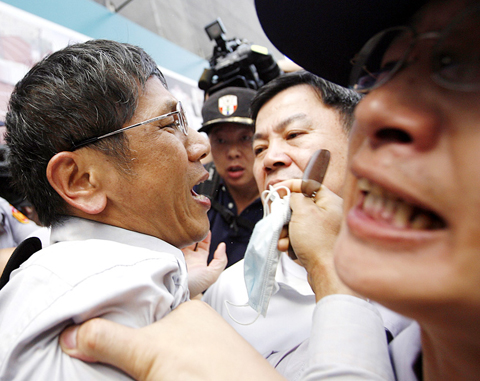Chinatrust Financial Holding Co (中信金控) yesterday expressed an interest in acquiring Nan Shan Life Insurance Co (南山人壽), a local subsidiary of the financially troubled American International Group Inc (AIG).
“We will place bids at the auction [to be organized by AIG] on July 3,” Charles Lo (羅聯福), chairman of the group’s subsidiary Chinatrust Commercial Bank (中國信託商銀), told reporters on the sidelines of the financial service provider’s annual shareholders’ meeting yesterday.
Lo said Chinatrust’s bancassurance channel would create synergies for both financial institutions if a merger went through since 96 percent of Nan Shan’s policies were traditional insurance products.

PHOTO: NICKY LOH, REUTERS
Among other potential bidders, Chinatrust will be competing head to head with state-run First Financial Holding Co (第一金控), which has also expressed an interest in acquiring the life insurance business for NT$60 billion (US$1.82 billion) by partnering with Aviva PLC to place a bid.
Nan Shan vice president April Pan (潘玲嬌) said yesterday that her company hasn’t been informed of such an auction and thus refused to comment on any market speculation, including whether parent company AIG had lowered the asking price for Nan Shan from NT$100 billion to NT$60 billion.
As of press time, AIG had not returned e-mails asking for confirmation of an auction.
Chinatrust Financial yesterday also reiterated its stance that it would shoulder its responsibilities over the sales of Lehman Brothers-linked structured notes after crowds of angry investors protested outside its headquarters in Taipei’s Xinyi District (信義) and chairman Jeffrey Koo’s (辜濂松) residence in Tianmu (天母), Taipei.
A representative from the Structured Notes Self-Salvation Organization (連動債聯合自救會) said that investors remained unsatisfied with the bank’s reimbursement of their losses.
In separate news, Taishin Financial Holding Co (台新金控) and Yuanta Financial Holding Co (元大金控) both held their annual shareholders’ meetings yesterday, and both vowed to expand their presence in China.
Taishin Financial chairman Thomas Wu (吳東亮) told investors that he was forced to sell off the company’s brokerage unit, Taishin Securities Co (台証證券), to KGI Securities Co (凱基證券) for NT$29 billion after the government disrupted its planned merger with Chang Hwa Commercial Bank (彰化銀行), in which Taishin Financial owns a 22.5 percent stake, worth NT$36.5 billion.
However, the company plans to set up or acquire a small brokerage by the end of this year and is in talks with several Chinese banks with regards to possible merger and acquisition opportunities, he added.
The company would cancel a plan to issue 450 million new shares because the sale of Taishin Securities had enabled the company to raise enough funds to improve its capital structure.
Taishin Financial also approved a proposal to reduce the company’s capital by NT$4.73 billion and write off last year’s losses, its press release said.
Meanwhile, Yuanta Financial chairman Yen Ching-chang (顏慶章) told shareholders that the financial service provider had not ruled out the possibility of transplanting its successful securities brokerage businesses into China.
The company said it would also look for potential opportunities to acquire rival brokerage firms.

SELL-OFF: Investors expect tariff-driven volatility as the local boarse reopens today, while analysts say government support and solid fundamentals would steady sentiment Local investors are bracing for a sharp market downturn today as the nation’s financial markets resume trading following a two-day closure for national holidays before the weekend, with sentiment rattled by US President Donald Trump’s sweeping tariff announcement. Trump’s unveiling of new “reciprocal tariffs” on Wednesday triggered a sell-off in global markets, with the FTSE Taiwan Index Futures — a benchmark for Taiwanese equities traded in Singapore — tumbling 9.2 percent over the past two sessions. Meanwhile, the American depositary receipts (ADRs) of Taiwan Semiconductor Manufacturing Co (TSMC, 台積電), the most heavily weighted stock on the TAIEX, plunged 13.8 percent in

A wave of stop-loss selling and panic selling hit Taiwan's stock market at its opening today, with the weighted index plunging 2,086 points — a drop of more than 9.7 percent — marking the largest intraday point and percentage loss on record. The index bottomed out at 19,212.02, while futures were locked limit-down, with more than 1,000 stocks hitting their daily drop limit. Three heavyweight stocks — Taiwan Semiconductor Manufacturing Co (TSMC, 台積電), Hon Hai Precision Industry Co (Foxconn, 鴻海精密) and MediaTek (聯發科) — hit their limit-down prices as soon as the market opened, falling to NT$848 (US$25.54), NT$138.5 and NT$1,295 respectively. TSMC's

TARIFFS: The global ‘panic atmosphere remains strong,’ and foreign investors have continued to sell their holdings since the start of the year, the Ministry of Finance said The government yesterday authorized the activation of its NT$500 billion (US$15.15 billion) National Stabilization Fund (NSF) to prop up the local stock market after two days of sharp falls in reaction to US President Donald Trump’s new import tariffs. The Ministry of Finance said in a statement after the market close that the steering committee of the fund had been given the go-ahead to intervene in the market to bolster Taiwanese shares in a time of crisis. The fund has been authorized to use its assets “to carry out market stabilization tasks as appropriate to maintain the stability of Taiwan’s

STEEP DECLINE: Yesterday’s drop was the third-steepest in its history, the steepest being Monday’s drop in the wake of the tariff announcement on Wednesday last week Taiwanese stocks continued their heavy sell-off yesterday, as concerns over US tariffs and unwinding of leveraged bets weighed on the market. The benchmark TAIEX plunged 1,068.19 points, or 5.79 percent, to 17,391.76, notching the biggest drop among Asian peers as it hit a 15-month low. The decline came even after the government on late Tuesday authorized the NT$500 billion (US$15.2 billion) National Stabilization Fund (國安基金) to step in to buoy the market amid investors’ worries over tariffs imposed by US President Donald Trump. Yesterday’s decline was the third-steepest in its history, trailing only the declines of 2,065.87 points on Monday and